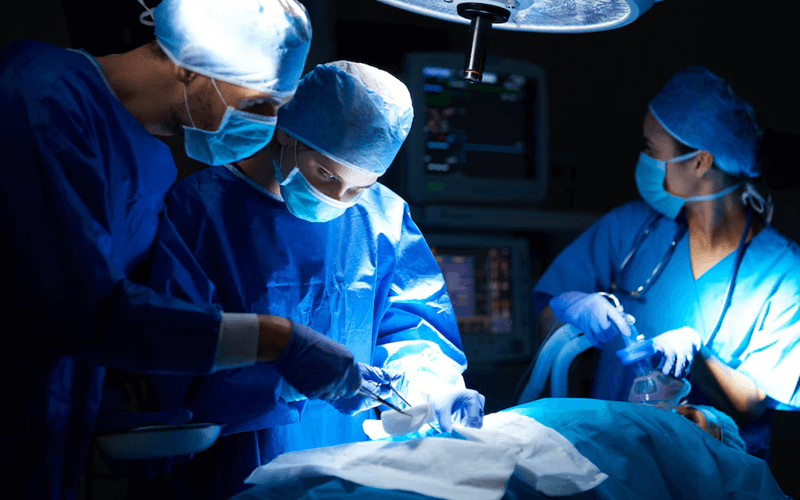In the realm of modern medicine, advancements in surgical techniques have transformed the way patients receive care. Among these innovations, laparoscopic surgery stands out as a groundbreaking approach, offering minimally invasive solutions for numerous medical conditions. At Al-Suffah Hospital, we take pride in providing state-of-the-art laparoscopic surgical services, ensuring our patients benefit from faster recovery times, minimal discomfort, and the highest standards of care.
Laparoscopic surgery is a testament to how far medicine has come—minimizing pain, reducing recovery time, and improving outcomes while prioritizing the patient’s comfort and well-being.
Dr. Atif Khan
What is Laparoscopic Surgery?
Laparoscopic surgery, also known as minimally invasive surgery, involves performing operations through small incisions using a specialized instrument called a laparoscope. This device is a thin, flexible tube equipped with a camera and light source, enabling surgeons to view the inside of the abdomen or pelvis on a monitor. By eliminating the need for large incisions, laparoscopic surgery significantly reduces the trauma associated with traditional open surgery.
How Does Laparoscopic Surgery Work?
During a laparoscopic procedure, the surgeon creates small incisions, typically no more than half an inch long, to insert the laparoscope and other surgical instruments. Carbon dioxide gas is used to inflate the surgical area, providing a clear view and more room for precise operation. The real-time video feed from the laparoscope guides the surgeon, ensuring accuracy and effectiveness throughout the procedure.
Applications of Laparoscopic Surgery
Laparoscopic surgery is a versatile technique used to address a wide range of medical conditions across multiple specialties. Some common applications include:
General Surgery
-
Appendectomy: Removal of the appendix.
-
Cholecystectomy: Removal of the gallbladder to treat gallstones or infections.
-
Hernia Repair: Repairing abdominal or inguinal hernias with minimal tissue disruption.
Gynecology
-
Hysterectomy: Removal of the uterus.
-
Ovarian Cyst Removal: Treating ovarian cysts to alleviate pain and restore normal function.
-
Endometriosis Treatment: Removing or reducing endometrial tissue to improve fertility and reduce discomfort.
Urology
-
Nephrectomy: Removal of one or both kidneys.
-
Prostatectomy: Surgical removal of the prostate gland.
Bariatric Surgery
-
Procedures such as gastric bypass and sleeve gastrectomy to aid in significant weight loss for obese patients.
Oncology
-
Diagnosis and removal of certain types of cancers, including colorectal, gastric, and ovarian cancers.
Advantages of Laparoscopic Surgery
Laparoscopic surgery offers numerous advantages over traditional open surgery, making it the preferred choice for patients and surgeons:
Minimized Scarring
-
Small incisions result in less noticeable scars, enhancing aesthetic outcomes.
Reduced Pain and Discomfort
-
Smaller incisions cause less tissue damage, leading to significantly less postoperative pain.
Faster Recovery
-
Most patients can return to their daily activities within days or weeks, compared to months for open surgery.
Shorter Hospital Stay
-
Many laparoscopic procedures are performed on an outpatient basis, reducing the time spent in the hospital.
Lower Risk of Infection
-
Smaller incisions decrease the risk of wound infections and other complications.
Improved Precision
-
The high-definition video feed provides surgeons with a magnified view, ensuring greater accuracy during the procedure.
Risks and Considerations
While laparoscopic surgery is generally safe, it is not without risks. Potential complications include:
-
Infection: Rare, but infections can occur at the incision sites.
-
Bleeding: Minimal but possible, especially in complex procedures.
-
Organ Injury: Accidental injury to surrounding organs, though uncommon with experienced surgeons.
-
Adverse Reaction to Anesthesia: A standard risk in all surgeries requiring general anesthesia.
It is essential to consult your surgeon to fully understand the risks and determine whether laparoscopic surgery is suitable for your condition.
Preparing for Laparoscopic Surgery
Preparation is key to a successful surgical outcome. Here are essential steps patients should follow:
Medical Assessment
-
-
Comprehensive evaluations, including blood tests, imaging, and a detailed medical history, are conducted to determine fitness for surgery.
-
Preoperative Instructions
-
-
Patients are advised to avoid food and drinks for a specific period before the procedure.
-
Medications may need adjustments based on the surgeon’s recommendations.
-
Lifestyle Modifications
-
-
Smoking cessation and maintaining a healthy diet can enhance healing and recovery.
-
Postoperative Care and Recovery
Adhering to postoperative care guidelines ensures a smooth recovery:
-
Pain Management: Over-the-counter or prescribed pain relief medications may be used.
-
Wound Care: Keep incision sites clean and dry to prevent infection.
-
Activity Levels: Gradually return to daily activities, avoiding strenuous tasks until cleared by your doctor.
-
Follow-Up Visits: Regular check-ups allow your surgeon to monitor healing and address any concerns.
Why Choose Al-Suffah Hospital for Laparoscopic Surgery?
At Al-Suffah Hospital, we prioritize patient safety and satisfaction. Here’s why we are the top choice for laparoscopic surgery:
-
Experienced Surgeons: Our team comprises highly skilled and certified laparoscopic surgeons with years of experience.
-
State-of-the-Art Facilities: We employ the latest laparoscopic equipment and techniques to deliver outstanding results.
-
Personalized Care: Each patient receives individualized attention, ensuring their unique needs are met.
-
Comprehensive Support: From preoperative counseling to postoperative care, we guide you every step of the way.
Conclusion
Laparoscopic surgery has revolutionized modern surgical practices, offering patients a safer, faster, and more comfortable alternative to traditional methods. At Al-Suffah Hospital, our unwavering commitment to excellence ensures you receive advanced medical care coupled with compassionate service. If you or a loved one is considering laparoscopic surgery, trust Al-Suffah Hospital to provide exceptional care and guide you toward better health.
For more information or to schedule a consultation, contact Al-Suffah Hospital today. Your health is our priority!



Comments are closed